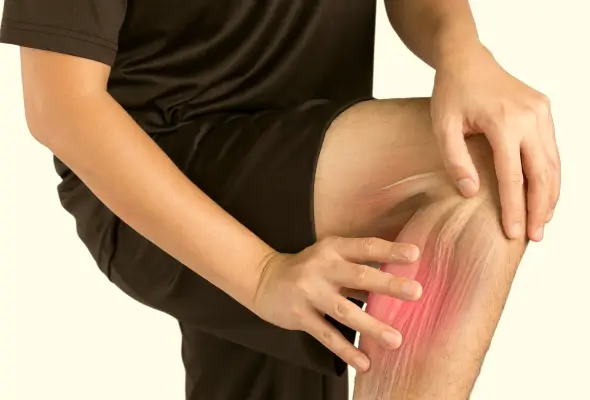-
Doctors
-
Specialities & Treatments
Centre of Excellence
Specialties
Treatments and Procedures
Hospitals & Directions HyderabadCARE Hospitals, Banjara Hills CARE Outpatient Centre, Banjara Hills CARE Hospitals, HITEC City CARE Hospitals, Nampally Gurunanak CARE Hospitals, Musheerabad CARE Hospitals Outpatient Centre, HITEC City CARE Hospitals, Malakpet
HyderabadCARE Hospitals, Banjara Hills CARE Outpatient Centre, Banjara Hills CARE Hospitals, HITEC City CARE Hospitals, Nampally Gurunanak CARE Hospitals, Musheerabad CARE Hospitals Outpatient Centre, HITEC City CARE Hospitals, Malakpet Raipur
Raipur
 Bhubaneswar
Bhubaneswar Visakhapatnam
Visakhapatnam
 Nagpur
Nagpur
 Indore
Indore
 Chh. Sambhajinagar
Chh. SambhajinagarClinics & Medical Centers
Book an AppointmentContact Us
Online Lab Reports
Book an Appointment
Consult Super-Specialist Doctors at CARE Hospitals

Calf Pain
Symptom, Causes, Diagnosis and Treatment
Calf Pain
Calf pain is a common complaint that affects many people, causing discomfort and limiting mobility. It can be mild to severe in intensity and often occurs during physical activity or at night. Understanding the calf pain causes and knowing how to relieve it can help you manage this condition effectively & prevent it from interfering with your daily life. Let's understand the symptoms of calf pain, its potential causes, and effective ways to treat it.

What is Calf Muscle Pain?
Calf muscle pain refers to discomfort in the back of the lower leg, specifically in the area behind the shinbone. This pain can manifest as a dull ache or a sharp sensation, varying from person to person. The calf comprises two main muscles, the gastrocnemius and the soleus, which join at the Achilles tendon and attach to the heel bone. The pain can range from mild soreness to severe cramping and may be accompanied by swelling or stiffness.
Causes of Calf Pain
Calf pain can stem from various sources, ranging from minor muscle issues to more serious vascular problems, such as:
- Muscle-related causes often include cramps, strains, and contusions. Cramps, or "Charley horses," occur when muscles suddenly contract, causing brief but intense pain. These can result from dehydration or overexertion. Strains happen when calf muscles are overstretched, potentially leading to a torn muscle in severe cases. Contusions, caused by direct blows to the muscle, can lead to bruising and soreness.
- Vascular issues can also cause calf pain. Claudication, a condition where narrowed arteries limit blood flow to muscles, can cause pain during exercise or walking. It's particularly common in smokers, diabetics, or those with peripheral artery disease (PAD). In rare cases, deep vein thrombosis (DVT) can masquerade as calf muscle pain. This serious condition involves blood clot formation in the lower leg and requires immediate medical attention.
- Other potential causes include tendonitis, where inflammation of tendons connecting calf muscles to bones causes pressure and pain.
- Achilles tendon injuries, sciatica, and diabetic peripheral neuropathy can also lead to calf pain.
- In some cases, varicose veins or compartment syndrome might be responsible.
Calf Pain Symptoms
The experience differs for each individual, but common symptoms include:
- Sudden pain during physical activity
- Stiffness and weakness when walking
- Difficulty rising onto the toes
- Swelling or bruising in the affected area
The severity of calf pain can be categorised into three grades:
- Mild: Sharp pain during or after activity
- Moderate: Pain that prevents regular activity
- Severe: Intense pain between the Achilles tendon and the middle of the muscle
Diagnosis
Doctors diagnose calf pain through a thorough physical examination. They assess whether a pulled or strained muscle is causing the discomfort.
Doctors may order a musculoskeletal ultrasound scan if the issue appears more severe. This scan can identify various conditions, including arterial claudication, Achilles tendinitis, plantar fascia issues, and deep vein thrombosis (DVT). The ultrasound also guides injection therapy if needed.
Calf Pain Treatment
The treatment for calf pain depends on its cause and severity. Several home remedies and self-care techniques can provide mild to moderate calf pain relief.
- The RICE method is a common approach for treating calf muscle pain:
- Rest: Avoid activities that worsen the pain.
- Ice: Apply cold packs to the area that is in pain for 20 minutes every two hours.
- Compression: Use a bandage to reduce swelling.
- Elevation: Keep the leg raised, preferably above heart level.
- For muscle cramps, gently stretching or massaging the calf can help. If cramps persist or occur frequently, it's advisable to consult a doctor.
- Over-the-counter (OTC) pain relievers can help manage pain and inflammation.
- For more severe injuries, such as strains or Achilles tendonitis, doctors might recommend:
- Physical therapy
- Soft cast or boot for immobilisation
- Gentle exercises like calf raises (once pain subsides)
- In cases of vascular issues like claudication, treatment may include:
- Diet modifications to reduce sodium, cholesterol, and sugar intake
- Exercise programmes
- Medications for blood pressure, cholesterol, and diabetes management
- Quitting smoking
- For serious conditions like deep vein thrombosis or compartment syndrome, medical intervention, including surgery or specific medications, may be necessary.
When should I See my Doctor?
While calf pain is often harmless, certain symptoms warrant immediate medical attention.
- Individuals should contact their doctor if they notice discolouration in their legs, feet, or toes, such as pale or bluish skin.
- Problems with movement or walking also require medical evaluation.
- If someone experiences severe or sudden calf pain, especially without any apparent cause
- Swelling in the calf or anywhere in the lower leg
- Swollen legs accompanied by difficulty in breathing
- Sudden inability to stand or put pressure on the leg
- Calf pain after sitting for a long time, particularly after a long car trip or plane ride
Prevention
Preventing calf pain involves adopting several strategies to maintain muscle health & reduce the risk of injury, including:
- Regular mobility helps keep the ankle and calf muscles flexible. This includes stretching exercises and moving joints through their full range of motion.
- Rest between workouts allows muscles to repair and grow, reducing the likelihood of strain.
- A proper warm-up before exercise and cool-down afterwards loosens muscles and prevents future injuries.
- Wearing appropriate footwear during physical activities, especially running or jogging, provides necessary support to the feet and calves.
- Dehydration often leads to muscle cramps, so drinking plenty of water during and after physical activity is essential.
- A gradual approach is recommended for those new to exercise or increasing workout intensity. Abrupt increases in activity levels can cause injury, so following a structured exercise plan or working with a trainer can be beneficial.
Home Remedies for Calf Muscle Pain
Several effective calf pain home remedies can help alleviate calf pain. The RICE method is a common approach for immediate relief. Other home remedies are:
- Epsom salt baths can be beneficial. Adding Epsom salt to warm bathwater creates a solution rich in magnesium sulphate, which acts as an electrolyte. Soaking the legs in this mixture helps regulate nerve signals, reducing inflammation and swelling.
- Applying a heating pad to the calf muscle several times a day can increase blood flow, helping to flush out inflammation-causing substances. This method aids in relaxing tight muscles and promoting healing.
- Gentle stretching and foam rolling can also provide relief. Stretching the calf muscles slowly and steadily helps lengthen muscle fibres and reduce pain. Foam rolling for about 20 minutes can improve tissue healing and decrease muscle swelling.
- Nutrition plays a crucial role in recovery. Consuming protein-rich foods like chicken or fish and antioxidant-rich options such as pomegranates and kale can aid muscle function recovery.
- Tart cherry juice, universally acclaimed for its anti-inflammatory properties, may help reduce muscle soreness.
- Adequate sleep is essential for recovery, as lack of sleep can exacerbate inflammation.
Conclusion
The key to dealing with calf pain lies in prevention and prompt action. By following the tips and remedies discussed, such as proper warm-ups, staying hydrated, and using natural calf pain remedies like the RICE method, you can reduce the risk of calf pain and handle it better when it occurs. Remember, while many cases of calf pain are harmless, a doctor should always check persistent or severe pain to ensure proper care and prevent serious complications.
FAQ's
1. What deficiency causes calf pain?
A lack of potassium, sodium, magnesium, vitamin D, and certain B vitamins may increase the chances of muscle cramps. Calcium deficiency, known as hypocalcaemia, can also lead to muscle issues.
2. Why do my calves hurt at night?
Calf pain at night has several potential causes, such as:
- Dehydration and lack of salts in body fluids are the most common causes of calf pain at night
- Poor circulation
- Varicose veins
- Pregnancy
- Nerve compression
3. How do you relieve calf pain?
To relieve calf pain, try the RICE method: Rest, Ice, Compression, and Elevation. Gently stretching or massaging the calf can help with muscle cramps. Over-the-counter pain relievers can manage pain and inflammation. Coconut water or smoothies can be beneficial for hydration and electrolyte replenishment. Applying heat or cold to the affected area may also provide relief. Sometimes, physical therapy or specific exercises like calf raises may be recommended once the pain subsides.
4. When should I be worried about calf pain?
Seek medical attention if you experience discolouration in your leg, feet, or toes, such as very pale or bluish skin. Problems with movement or walking, severe or sudden calf pain, and swelling in the calf or lower leg are reasons to consult a doctor. If you have deep vein thrombosis (DVT) symptoms after prolonged sitting, such as a swollen, painful, or red calf, seek immediate medical care. Additionally, seeing a doctor is advisable if calf pain persists or worsens despite home treatment.
5. Is calf pain serious?
While calf pain is often harmless and caused by minor issues like muscle strains or While calf pain is often harmless and caused by minor issues like muscle strains or cramps, it can sometimes indicate more serious conditions like claudication, deep vein thrombosis (DVT), chronic compartment syndrome and pulmonary embolism.
To Book an Appointment, call:
Still Have a Question?




